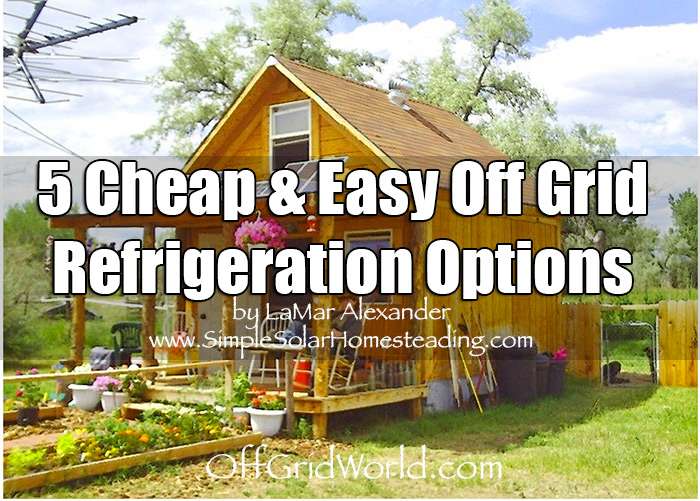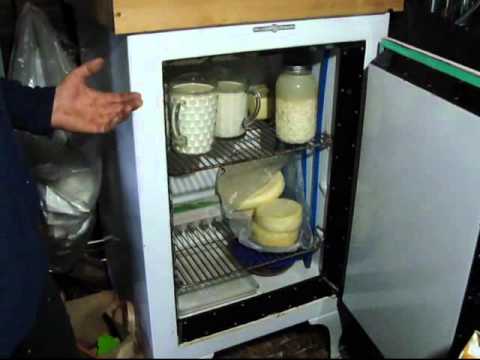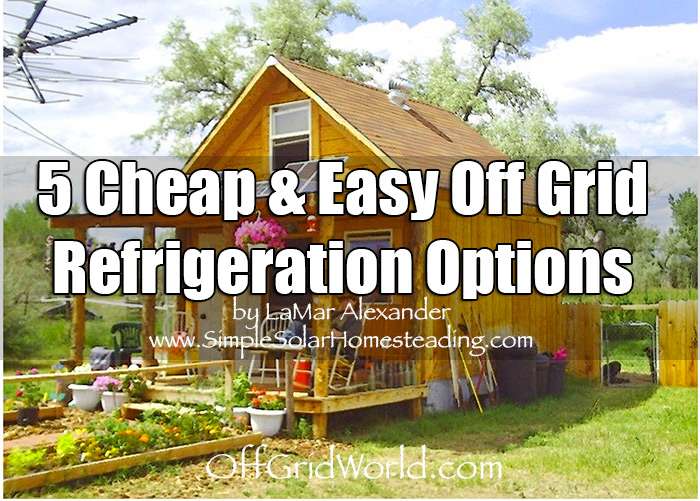In this article, we will be discussing the topic of creating an off-grid refrigerator: a guide to refrigeration without electricity. Throughout this article, you will learn about the concept of off-grid living and the challenges of living without access to electricity. We will also explore the various methods and techniques for creating a refrigerator that operates independently from the electrical grid. By the end of this article, you will have a better understanding of how to create your own off-grid refrigerator and enjoy the benefits of refrigeration even without electricity.
Creating an Off Grid Refrigerator: A Guide to Refrigeration Without Electricity

Off Grid Living
Understanding Off Grid Living
Off grid living refers to a lifestyle that is independent of public utilities such as electricity, water, and gas. It involves relying on alternative sources of energy and adopting self-sufficient methods for meeting daily needs. Many people choose off grid living to reduce their reliance on traditional energy sources, lower their carbon footprint, and embrace a simpler and more sustainable way of life.
Advantages of Off Grid Living
There are several advantages to living off the grid. Firstly, it provides individuals with the ability to be self-reliant and reduces their dependency on external resources. It also allows them to have control over their energy usage and reduce their monthly utility bills significantly. Off grid living also promotes a more sustainable lifestyle as it encourages the use of renewable energy sources, such as solar or wind power, which are better for the environment. Additionally, off grid living can offer a sense of freedom and independence, allowing individuals to disconnect from the stresses of modern society.
Challenges of Off Grid Living
While off grid living has its benefits, it also comes with its own set of challenges. One of the main challenges is the initial cost associated with setting up an off grid system, including the installation of solar panels or wind turbines, battery storage, and other necessary equipment. Additionally, there may be limitations on the amount of energy that can be generated and stored, which may require individuals to adjust their lifestyle accordingly. Another challenge is the need for regular maintenance and monitoring of the off grid system to ensure optimal performance. Finally, living off the grid may require individuals to adapt their daily routines and habits to ensure efficient energy usage and conservation.
Introduction to Off Grid Refrigeration
The Need for Off Grid Refrigeration
Refrigeration is an essential part of our daily lives, allowing us to preserve perishable food items, medications, and other temperature-sensitive products. However, traditional refrigeration methods rely heavily on electricity, making them unsuitable for off grid living. This is where off grid refrigeration comes in, offering a sustainable and efficient solution to keep food and other goods cool without the need for electricity.
Benefits of an Off Grid Refrigerator
An off grid refrigerator offers several benefits for individuals living off the grid. Firstly, it provides a reliable method of food preservation, ensuring that perishable items stay fresh for longer periods. This can be particularly beneficial for individuals who rely on homegrown produce or have limited access to grocery stores. Secondly, an off grid refrigerator allows individuals to reduce their energy consumption and lower their carbon footprint, contributing to a more sustainable lifestyle. Lastly, the absence of electricity dependence means that individuals can enjoy uninterrupted cooling, even during power outages or in remote locations.
Cooling Methods for Off Grid Refrigeration
Principles of Cooling
Before delving into the various cooling methods for off grid refrigeration, it is essential to understand the basic principles of cooling. The process of cooling involves removing heat from an enclosed space, which lowers the temperature. There are several ways to achieve this, including natural cooling methods and alternative cooling technologies.
Natural Cooling Methods
One of the simplest natural cooling methods is to take advantage of temperature differences between the indoors and outdoors. By positioning the refrigerator in a cool, shaded area and ensuring proper airflow, individuals can harness natural convection currents and heat exchange to maintain a desirable temperature inside the refrigerator. This method works best in regions with moderate climates or during cooler seasons.
Another natural cooling method is to utilize underground storage. By burying the refrigerator partially underground, individuals can take advantage of the earth’s natural insulation properties to keep the contents cool. The cool temperature of the soil helps to regulate the internal temperature of the refrigerator, ensuring optimal cooling without electricity.
Alternative Cooling Methods
In addition to natural cooling methods, there are alternative cooling technologies that can be used for off grid refrigeration. These technologies may require a power source, such as solar or wind power, but they offer more advanced cooling capabilities compared to natural methods.
One such alternative cooling method is absorption refrigeration. Absorption refrigerators use a combination of heat and a refrigerant solution to generate cooling. They are commonly used in RVs and camping situations, making them ideal for off grid living. Another alternative cooling method is using evaporative cooling systems, which rely on the evaporation of water to generate cooling. These systems are particularly effective in arid climates and can provide cooling without the need for electricity.
Designing an Off Grid Refrigerator
Factors to Consider
When designing an off grid refrigerator, there are several factors to consider to ensure optimal performance and efficiency. Firstly, it is important to assess the available space and determine the size of the refrigerator. This will depend on the specific needs of the individual or household and the availability of materials for construction.
Secondly, insulation materials play a crucial role in maintaining the desired temperature inside the refrigerator. Choosing high-quality insulation materials that provide effective thermal resistance is essential for keeping the cold air inside and preventing heat transfer from the outside environment.
Finally, ventilation requirements should be taken into account when designing an off grid refrigerator. Proper ventilation helps to dissipate excess heat and prevent the buildup of condensation, which can lead to mold and mildew growth.
Choosing the Right Size
Selecting the right size for an off grid refrigerator depends on individual needs and the available resources for construction. It is important to consider the amount of food and other items that need to be stored, as well as the space available for the refrigerator. Smaller refrigerators are generally more energy-efficient, but they may require more frequent restocking. Larger refrigerators offer more storage space but may require a larger power supply.
Insulation Materials
Choosing the right insulation materials is crucial for the efficient operation of an off grid refrigerator. Some commonly used insulation materials include polystyrene foam, polyurethane foam, and vacuum insulation panels. These materials provide excellent thermal resistance and help to minimize heat transfer, thereby maintaining the desired temperature inside the refrigerator.
Ventilation Requirements
Proper ventilation is important for preventing the buildup of excess heat and moisture inside the off grid refrigerator. Ventilation can be achieved through air vents or fans that help to circulate the air and dissipate heat. It is important to ensure that the ventilation system is well-designed and properly sized for the refrigerator to maintain optimal cooling efficiency.

Building an Off Grid Refrigerator
Gathering Materials and Tools
Before beginning the construction process, it is essential to gather all the necessary materials and tools. The specific materials required will depend on the design and size of the refrigerator, as well as personal preferences. Some common materials needed for building an off grid refrigerator include insulation panels, plywood or other suitable construction materials, hinges, latches, and weatherstripping.
In terms of tools, a basic toolkit comprising of a saw, drill, screws, measuring tape, and a level will be sufficient for most off grid refrigerator construction projects. It is important to ensure that all tools are in good working condition and to take necessary safety precautions, such as wearing appropriate protective gear.
Step-by-Step Construction Process
- Begin by constructing the frame of the refrigerator using the chosen construction materials. Measure and cut the pieces to the desired dimensions, ensuring that they are properly aligned and secured.
- Once the frame is complete, attach insulation panels to the interior walls using adhesive or screws. Make sure to create a tight seal to prevent heat transfer.
- Install the door of the refrigerator using hinges and latches. It is important to ensure that the door seals tightly when closed to maintain the internal temperature.
- Add weatherstripping around the edges of the door to further improve insulation and prevent air leakage.
- Install any necessary ventilation systems, such as air vents or fans, to ensure proper airflow and heat dissipation.
- Test the refrigerator to ensure that it is functioning correctly. Monitor the internal temperature and make any necessary adjustments to achieve the desired cooling.
Tips for Successful Construction
- Take accurate measurements and plan the design beforehand to ensure the efficient use of materials.
- Use high-quality insulation materials to maximize the refrigerator’s cooling capabilities.
- Regularly check for any air leaks or gaps in the insulation and seal them promptly.
- Consider adding additional insulation layers on the top and sides of the refrigerator for enhanced thermal resistance.
- Regularly clean and maintain the refrigerator to prevent the buildup of dirt, mold, and mildew.
Alternative Power Sources for Off Grid Refrigeration
Solar Power
Solar power is one of the most common and reliable alternative power sources for off grid refrigeration. It involves using solar panels to convert sunlight into electricity, which can then be used to power the refrigerator. Solar power offers a sustainable and renewable energy solution, making it an ideal choice for off grid living.
Wind Power
Wind power can also be harnessed to generate electricity for off grid refrigeration. Wind turbines convert the kinetic energy of the wind into electrical energy, which can be stored in batteries for later use. Wind power is particularly suitable for individuals living in areas with consistent wind patterns.
Hydro Power
Hydro power utilizes the energy of flowing water to generate electricity. By harnessing the power of streams or rivers, individuals can generate enough electricity to power an off grid refrigerator. Hydro power is a reliable and consistent energy source, making it an attractive option for off grid living near water bodies.
Biogas Power
Biogas is a renewable energy source that is generated through the decomposition of organic matter, such as food waste or agricultural waste. Biogas can be used to fuel a generator, which in turn powers the off grid refrigerator. This sustainable option not only provides electricity but also helps reduce waste and greenhouse gas emissions.

Maintaining an Off Grid Refrigerator
Cleaning and Sanitizing
Regular cleaning and sanitizing of an off grid refrigerator are essential for maintaining its efficiency and preventing the growth of bacteria or mold. To clean the refrigerator, remove all items and wipe down the interior with a mild detergent and warm water. Pay attention to the corners and crevices, as these areas are prone to dirt and bacteria buildup. Rinse thoroughly and dry the interior before restocking the refrigerator.
Temperature Control
Monitoring and controlling the temperature of the off grid refrigerator is crucial for keeping the contents fresh and safe for consumption. Use a thermometer to regularly check the internal temperature and adjust as necessary. Aim to keep the temperature between 35°F and 40°F (1.7°C to 4.4°C) to ensure optimal food preservation.
Food Storage Tips
Proper food storage is important for maintaining the freshness and quality of perishable items in an off grid refrigerator. Store raw meats and fish on the lower shelves to prevent cross-contamination in case of leaks or spills. Keep fruits and vegetables separate to prevent premature ripening or spoilage. It is also advisable to keep a stock of non-perishable items, such as canned goods or dried foods, for emergencies or periods of limited power supply.
Troubleshooting Common Issues
Lack of Cooling
If the off grid refrigerator is not cooling adequately, there may be several possible causes. Start by checking the insulation to ensure there are no air leaks or gaps. Verify that the ventilation system is functioning properly and that there is adequate airflow. If the issue persists, consider increasing the insulation thickness or adjusting the ventilation system accordingly.
Inadequate Power Supply
If the off grid refrigerator is not receiving sufficient power to operate, it may be due to a problem with the power source or storage system. Verify that the solar panels or wind turbines are properly oriented and receiving adequate sunlight or wind. Check the batteries to ensure they are functioning correctly and holding a charge. It may be necessary to add additional power sources or upgrade the storage system to meet the refrigerator’s energy needs.
Thermostat Malfunction
If the temperature inside the off grid refrigerator is not consistent or the thermostat is not functioning correctly, it may be necessary to replace or recalibrate the thermostat. Consult the manufacturer’s instructions or seek professional assistance to ensure accurate temperature control.

Safety Precautions for Off Grid Refrigeration
Electrical Safety
When incorporating alternative power sources for off grid refrigeration, it is important to prioritize electrical safety. Follow all safety guidelines provided by the manufacturer when installing and maintaining solar panels, wind turbines, or other power-generating equipment. Use appropriate protective gear and take necessary precautions to avoid electric shocks or other electrical accidents.
Use of Proper Insulation Materials
Selecting and using proper insulation materials is crucial for off grid refrigeration. Ensure that the insulation materials used are non-toxic and safe for contact with food. Avoid using insulation materials that may release harmful chemicals or emit strong odors that can contaminate the stored items.
Prevention of Mold and Mildew
Regularly clean and inspect the off grid refrigerator to prevent the growth of mold and mildew. Ensure that the ventilation system is working effectively to remove excess moisture and prevent condensation. Keep the refrigerator dry and well-ventilated, especially during humid periods, to minimize the risk of mold and mildew growth.
Comparison with Traditional Refrigerators
Energy Efficiency
Off grid refrigerators are typically more energy-efficient compared to traditional refrigerators. Traditional refrigerators rely on a constant supply of electricity, which can lead to high energy consumption and utility costs. In contrast, off grid refrigerators utilize alternative power sources, such as solar or wind power, which are often more sustainable and cost-effective in the long run.
Environmental Impact
Off grid refrigerators have a lower environmental impact compared to traditional refrigerators. Traditional refrigerators contribute to greenhouse gas emissions and the depletion of natural resources due to their reliance on fossil fuel-based electricity. Off grid refrigerators, on the other hand, promote the use of renewable energy sources, reducing carbon emissions and preserving natural resources.
Cost Considerations
While the initial cost of setting up an off grid refrigerator may be higher compared to a traditional refrigerator, the long-term cost savings can outweigh the initial investment. Off grid refrigerators eliminate the need for conventional electricity, resulting in reduced utility bills. Additionally, the use of renewable energy sources can provide a more stable and predictable cost of power over time.

Applications of Off Grid Refrigeration
Residential Use
Off grid refrigeration is suitable for residential use, especially for individuals or households living in remote areas or off the grid. It provides a reliable method of food storage and preservation without the need for electricity. Off grid refrigeration can also be a viable option for those looking to reduce their reliance on traditional energy sources and embrace a more sustainable lifestyle.
Camping and Outdoor Activities
Off grid refrigeration is ideal for camping and outdoor activities where access to electricity may be limited or nonexistent. Portable off grid refrigerators or coolers can be powered by alternative power sources, such as solar panels or batteries, providing a convenient way to keep food and beverages cold during outdoor adventures.
Emergency Preparedness
Off grid refrigeration can be a valuable asset during emergency situations, such as power outages or natural disasters. Having an off grid refrigerator ensures that perishable food items can be safely stored and preserved for a longer period, reducing the risk of food spoilage and waste.
Future Trends in Off Grid Refrigeration
Advancements in Cooling Technologies
As technology continues to evolve, there are likely to be advancements in off grid refrigeration technologies. This may include the development of more energy-efficient cooling systems, improved insulation materials, and innovative designs to maximize cooling capabilities. These advancements will further enhance the performance and reliability of off grid refrigeration systems.
Integration with Smart Home Systems
The integration of off grid refrigeration systems with smart home technology is another future trend to watch. This could include the use of sensors and automated controls to optimize energy usage, monitor temperature fluctuations, and provide real-time notifications. Smart home integration can enhance the convenience and efficiency of off grid refrigeration, making it even more appealing for individuals looking to embrace a sustainable lifestyle.
Conclusion
Creating an off grid refrigerator provides a sustainable and reliable solution for refrigeration without electricity. By understanding the principles of cooling, selecting suitable cooling methods, and designing and constructing an efficient refrigerator, individuals can enjoy the benefits of off grid living while still preserving perishable items. Whether for residential use, camping, or emergency preparedness, off grid refrigeration offers a practical and eco-friendly alternative to traditional refrigeration methods. With advancements in cooling technologies and the integration of smart home systems, the future of off grid refrigeration looks promising. Embrace the opportunity to reduce your carbon footprint, lower energy consumption, and enjoy the freedom of living off the grid with an off grid refrigerator.




